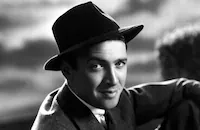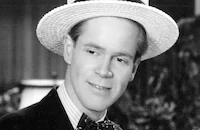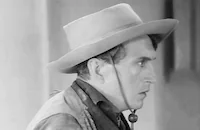Night Passage
Brief Synopsis
Cast & Crew
James Neilson
James Stewart
Audie Murphy
Dan Duryea
Dianne Foster
Elaine Stewart
Film Details
Technical Specs

Synopsis
At a railroad construction crew outside Junction City, Colorado, Grant McLaine, a former trouble-shooter who was dismissed five years earlier for allowing notorious robber The Utica Kid to escape, earns money by playing his accordion. After his former friend, railroad executive Ben Kimball, asks Grant to come to Junction City to discuss Whitey Harbin, the leader of a gang of outlaws that has been stealing the company payroll, Grant sets out on the trail. There, he meets Miss Vittle, a rough mining cook who reveals that a group of gold miners carved a hidden passage through the mountain that now serves as a shortcut into Junction City. Grant gratefully travels through the shaft and, once on the other side, saves young Joey Adams from Concho, a man who has been pursuing him. Grant offers Joey a ride into town, but the boy politely refuses, so Grant enters town alone. He stops at the city restaurant counter where Charlotte "Charlie" Drew, the sweet-natured girl friend of The Utica Kid, works as a server, and she reluctantly informs Grant, who suspects that The Utica Kid is behind the recent robberies, that the outlaw has left town. Grant then visits Ben's office, where he is forced to be civil to both Jeff Kurth, the man who fired him, and Ben's wife Verna, who failed to stand by Grant, her then-suitor, when he was accused of abetting The Utica Kid. Ben and Verna now urge Grant to accept a job transporting the $10,000 payroll back to the railroad camp, stating that no one would suspect that the company would trust him with the money. Jeff announces that he and his guards will hide in a railroad car behind Grant to keep an eye on him, and in response, Grant states that he will only take the assignment if he is given Jeff's job. Ben agrees, and outside, Verna kisses Grant for luck. Meanwhile, Joey enters town and, after convincing Charlie to let him help sell sandwiches to the railroad workers at the end of the line, boards the same train as Grant. While Joey sits next to Grant, Charlie sees Ben and Verna secretly board a private car on the same train, and follows them on Grant's horse. At the same time, Ben's accountant, Will Renner, who has missed the train, hires Miss Vittle to lead him through the mine shaft so he can catch the train farther down the line. On the train, Joey admits to Grant that he joined Whitey's gang under the tutelage of The Utica Kid, but after he tried to run away, Whitey sent Concho after him to keep him quiet. Just then, Concho hops into their car, but keeps his distance after he recognizes Grant. Watching the train from the hills is The Utica Kid, whose amiable disposition belies a quick mind and an even quicker gun. His alliance with the hot-tempered Whitey is an uneasy one, but Whitey retains control of the gang, and now, although The Utica Kid suggests that they let this payroll go through, Whitey refuses. The gang quickly derails the train and detaches the car containing Jeff and the guards, prompting Ben to suspect that Grant tipped them off. As Whitey futiley searches for the payroll, Grant and Joey hide the money in a shoebox. Frustrated, Whitey boards Ben's car and abducts a calm Verna, explaining that he will meet Ben later to trade her for the money. As the gang leaves, The Utica Kid takes Joey, who still holds the shoebox, with him, and Concho throws Grant over a cliff. Grant soon revives, however, and staggers back into town with his accordion. That night, the gang returns to their hideout, where Whitey guards Verna possessively, ignoring The Utica Kid's warning that she is trying to provoke the men into fighting over her. Charlie rides to the hideout in secret, and is almost attacked by gang member Howdy Sloden when Grant arrives and knocks him out. After chastising Charlie for her attachment to The Utica Kid, Grant strides into the hideout and asks to join the gang, forcing The Utica Kid to admit that his real name is Lee McLaine, and that Grant is his older brother. Thrilled by the rivalry, Whitey welcomes Grant, but Concho challenges Grant to a duel, which Grant wins easily. Grant then calls his brother outside, where he urges him to remember their parents' teachings and reform himself, but The Utica Kid, resentful that he has always been in Grant's shadow, refuses. Grant warns that if he leaves he will take the money, Joey and Verna with him, but The Utica Kid turns away and, spotting Charlie, promises to marry her. She, however, has overheard his discussion with Grant, and now rejects his proposal. When he reenters the hideout, Grant is playing a song from their childhood, and despite himself, The Utica Kid is moved by a memory of their father. Just then, Renner, who has been secretly informing Whitey about the payrolls, arrives and reveals that Grant was the one carrying the $10,000. Grant throws his accordion at the light and, under the cover of darkness, escapes outside in a burst of gunfire. He, Verna and Charlie race to the nearby mines with the gang in pursuit. Grant sends Verna through the shortcut to the end of the line, but Charlie refuses to leave him, and together they fight off the gang. When Grant is cornered and Joey runs to help him, Whitey shoots and wounds Joey, after which The Utica Kid joins Grant in fighting Whitey. Together, the brothers kill all of the gang except Whitey, who sneaks up behind them and shoots The Utica Kid. With only one bullet left, Grant kills Whitey, and holds his brother while he dies. Later, Charlie and Joey help him bury The Utica Kid, and then return the payroll to the railroad camp. There, Verna has told the story to Ben, and he and Jeff gratefully welcome Grant back to work. After shaking Jeff's hand, Grant takes Charlie's, and together they join the crew.

Director
James Neilson
Cast

James Stewart

Audie Murphy

Dan Duryea

Dianne Foster

Elaine Stewart

Brandon De Wilde

Jay C. Flippen

Herbert Anderson

Robert J. Wilke
Hugh Beaumont
Jack Elam
Tommy Cook

Paul Fix
Olive Carey

James Flavin

Donald Curtis

Ellen Corby
John Day
Kenny Williams
Frank Chase
Herold Goodwin
Harold Tommy Hart
Jack C. Williams
Boyd Stockman
Henry Wills
Chuck Roberson
Willard Willingham
Polly Burson
Patsy Novak
Ted Mapes
Crew
Glenn Anderson
Fred Banker
Martha Bunch
Leslie I. Carey
Borden Chase
Sherman Clark
Robert Clatworthy
Bill Dodds
Oliver Emert
Bob Forrest
William Fritzsche
Russell A. Gausman
Alexander Golitzen
Herold Goodwin
Marshall Green
James Havens
Lew Leary
Wilbur Mosier
Phil O'neil
Bob Pierce
Mark Reedal
Jim Rogers
Aaron Rosenberg
Bucky Rous
Clifford Stine
Virgil Summers
James Swartz
Bill Thomas
Dimitri Tiomkin
Dimitri Tiomkin
Sherman Todd
Ned Washington
James Welch
Bud Westmore
Frank H. Wilkinson

Film Details
Technical Specs

Articles
Night Passage
Stewart plays Grant McLaine, a railroad detective. McLaine's boss (Jay C. Flippen) is starting to suspect that his longtime employee is behind a series of train robberies, so he gives him one last chance to prove he's on the up and up. Unfortunately, the train McLaine is assigned to guard is once again robbed, and he's taken hostage by a gang of desperados. The gang's leader, Whitey Harbin (Dan Duryea), is especially pleased with a new sharp-shooting recruit called The Utica Kid (Audie Murphy.) What Harbin doesn't know is that The Kid is actually McLaine's younger brother, a situation that leads, not unexpectedly, to a final, twist-filled shootout.
Mann and Stewart, of course, were responsible for such films as Winchester 73 (1950), Bend of the River (1952 ), The Naked Spur (1953), and The Man from Laramie (1955), all of which rank among the greatest Westerns ever made. Those pictures are driven by a certain moral ambiguity, and, in some instances, even a bit of sadomasochism, two elements that are decidedly missing from Night Passage. Mann had originally agreed to direct Night Passage when Stewart offered it to him, but wound up dropping it in favor of The Tin Star (1957), a psychological Western drama starring Henry Fonda that was far more in keeping with his previous efforts. Certainly, Fonda's character is a more complex creation than Stewart's wronged railroad worker.
Although several industry insiders told Stewart that he, too, should abandon Night Passage once Mann backed out, he continued full-steam with the project, possibly out of stubbornness. But it may not have been quite that simple. Some people contend that Stewart wanted more control of the film, and only offered it to Mann because he knew he'd turn it down. Then he recruited newcomer James Neilson, who would willingly bend to his vision. Still others have suggested that Stewart so looked forward to performing two songs in the movie - "Follow the River" and "You Can't Get Far Without a Railroad" - that he simply refused to let the opportunity pass! It seems likely that Mann wouldn't have stopped the movie dead in its tracks to indulge Stewart in a couple of accordion solos.
Just as unexpected as Stewart's musical interludes was the casting of Audie Murphy as a murderous young tough. Up to this point in his film career, the actor usually played the traditional hero in such films as Destry (1955) and Walk the Proud Land (1956) but Night Passage introduced a sinister side of the baby-faced actor, prompting one critic to write, "You never can tell about Audie Murphy these days. Just recently he turned in the worst comedy performance of the year - in Joe Butterfly. Now he has been cast as a villain and the new look suits him a lot better." Not all his fans would agree but Murphy would go on to play an even more malevolent figure - a hired killer - in the 1959 Western, No Name on the Bullet.
Night Passage took a quick dive at the box office, although the trade paper, Variety, was surprisingly receptive, calling it "a taut, well-made, sometimes fascinating Western." Since Stewart's previous film, The Spirit of St. Louis, also failed to sell tickets, he suddenly found himself in the strange position of needing a hit. He would get one and then some with his next film - a little Alfred Hitchcock mind-bender called Vertigo (1958.)
Directed by: James Neilson
Screenplay: Borden Chase (based on a story by Norman A. Fox)
Cinematography: William Daniels
Music: Dimitri Tiomkin
Editing: Sherman Todd
Art Direction: Robert Clatworthy
Set Decoration: Oliver Emert and Russell A. Gausman
Costumes: Bill Thomas
Makeup: Bud Westmore
Cast: James Stewart (Grant McLaine), Audie Murphy (The Utica Kid), Dan Duryea (Whitey Harbin), Dianne Foster (Charlotte Drew), Elaine Stewart (Vera Kimball), Brandon De Wilde (Joey Adams), Jay C. Flippen (Ben Kimball), Herbert Anderson (Will Renner).
C-90m. Letterboxed.
by Paul Tatara

Night Passage
Quotes
Trivia
First feature in the Technirama widescreen process, developed by the Technicolor corporation.
This was originally intended to be the sixth Western combining the talents of actor 'James Stewart' and director 'Anthony Mann' (they had also done three non-Westerns together), but Mann pulled out of the project because he wasn't impressed with war hero turned actor Audie Murphy. Stewart and the director would never make another picture together.
Notes
Brandon deWilde's opening credit reads: "and Brandon deWilde as `Joey.'" As reported in a July 1956 Los Angeles Times article, Anthony Mann, who had directed James Stewart many times, was originally hired to direct Night Passage. In February 1956, however, a Hollywood Reporter news item stated that Mann withdrew from the film in order to finish editing the Security Pictures film Men in War. Modern sources add that Mann worked on the film's pre-production chores, but quit only days before the start of shooting due to disagreements over the script. Mann and Stewart never worked together again, and modern sources suggest that this was due to their disagreements over Night Passage.
An August 1956 "Rambling Reporter" item in Hollywood Reporter reported that Marianne Cook was cast in a leading role in Night Passage but withdrew after becoming pregnant. In addition, a September 1956 Hollywood Reporter article stated that Dorothy Malone had been cast, but left the production after she was denied "preferred billing."
Although an October 1956 New York Times article reported that the film's plot would include Stewart's character, "Grant McLaine," being beaten and dumped in a river, and would end with Grant shooting "The Utica Kid," in the finished film Grant remains relatively unscathed and The Utica Kid is killed by "Whitey Harbin."
Although many reviews asserted that Night Passage was the first feature to be shot in Technirama, a widescreen process developed by Technicolor, the first film shot using the process was The Monte Carlo Story (see entry above for more information on Technirama). A February 1956 Hollywood Reporter item described a new roving camera boom that head grip Virgil Summer developed for this production, which allowed the camera to remain level on uneven surfaces, such as loose sand.
According to Hollywood Reporter news items and Universal press materials, much of the film was shot on location in Silverton, Animas Canyon and Durango, CO, and Colorado governor Ed Johnson appeared in the film. Other 1956 Hollywood Reporter items add Boyd Morgan, Harry Jackson and Miss Universe runner-ups Marina Orschel and Ingrid Goude to the cast, but their appearance in the final film has not been confirmed. Modern sources add Kenne Duncan, Jack Lowell, John Davis, Paul Spahn and Herman Pulver to the cast.

Miscellaneous Notes
Released in United States Summer August 1957
Anthony Mann began the project's direction but left soon into production.
Technirama
Released in United States Summer August 1957














